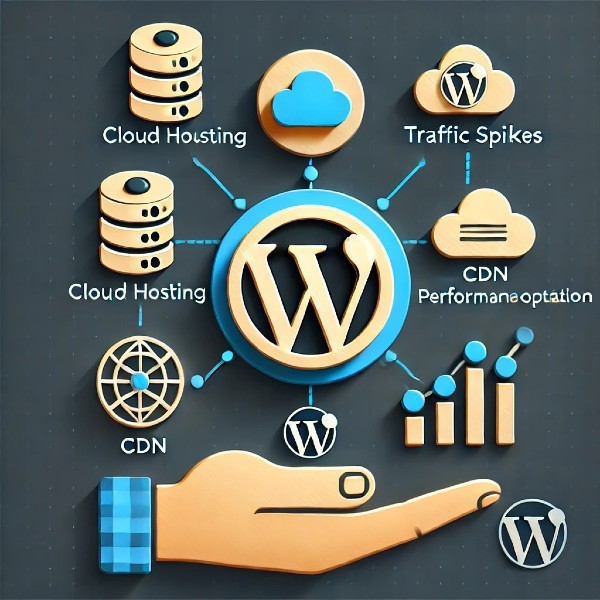Introduction
In today’s rapidly evolving digital landscape, scalability is a critical factor for the success and longevity of any website. For WordPress sites, the ability to scale efficiently ensures that your site can handle increased traffic, grow with your business, and maintain optimal performance under varying loads. This comprehensive guide will explore the concept of scalability in web hosting, provide practical steps for scaling your WordPress site, and offer insights into choosing scalable hosting solutions. We’ll also discuss planning for traffic spikes, present case studies of successful scalable WordPress hosting, and outline strategies for future-proofing your website.
What is Scalability in Web Hosting?
Scalability in web hosting refers to the ability of a hosting service to accommodate growth and increased demand without compromising performance. This includes handling more traffic, supporting larger amounts of data, and providing additional resources as needed. A scalable hosting solution can seamlessly adjust its capacity to meet the demands of your website, whether you’re experiencing a temporary spike in traffic or sustained growth over time. This adaptability is crucial for ensuring a smooth user experience and maintaining site performance, regardless of fluctuations in visitor numbers.
How to Scale Your WordPress Site
Scaling a WordPress site involves optimizing both the infrastructure and the site itself to handle increased traffic and data loads. One of the first steps is to choose a hosting provider that offers scalable solutions, such as cloud hosting or managed WordPress hosting. Implementing a content delivery network (CDN) can also help by distributing your content across multiple servers worldwide, reducing load times and server strain. Additionally, optimizing your site’s code, using efficient caching mechanisms, and regularly updating plugins and themes are essential practices for maintaining scalability.
Detailed Insights on Scaling
For example, a popular plugin like W3 Total Cache can significantly improve your site’s scalability by caching static files and reducing the load on your server. Another example is using a scalable database solution like Amazon RDS, which allows you to easily adjust capacity and performance settings based on your needs. By leveraging these tools and practices, you can ensure that your WordPress site remains responsive and performs well even as it grows.
Choosing Scalable WordPress Hosting
When selecting a scalable WordPress hosting provider, it’s essential to consider factors such as resource allocation, performance guarantees, and support for scaling. Providers like WP Engine, Kinsta, and SiteGround offer managed WordPress hosting plans specifically designed for scalability. These plans often include features like automatic scaling, advanced caching solutions, and access to a global CDN. Additionally, cloud hosting services from providers like Amazon Web Services (AWS) and Google Cloud Platform (GCP) offer flexible, scalable solutions that can be customized to meet your specific needs.
Detailed Insights on Hosting Providers
For instance, WP Engine provides a scalable infrastructure that includes automated backups, security features, and performance monitoring. Their platform is built on the Google Cloud Platform, ensuring high availability and reliability. Kinsta, another leading provider, offers scalable plans with features like container technology and Nginx servers, which optimize performance and scalability. By choosing a hosting provider that prioritizes scalability, you can ensure that your WordPress site can grow and adapt to changing demands.
Planning for Traffic Spikes
Traffic spikes can occur for various reasons, such as successful marketing campaigns, viral content, or seasonal events. Planning for these spikes is crucial to avoid downtime and ensure a smooth user experience. One effective strategy is to use a scalable hosting solution that can automatically adjust resources based on traffic levels. Implementing a CDN can also help distribute the load and prevent server overload. Additionally, optimizing your site’s performance through efficient caching, image compression, and minimizing unnecessary plugins can further enhance its ability to handle traffic surges.
Detailed Insights on Traffic Management
For example, during the Black Friday sales period, e-commerce sites often experience significant traffic spikes. A scalable hosting solution like AWS can automatically increase server capacity to handle the surge, ensuring that the site remains accessible and performs well. Another example is a viral blog post that drives unexpected traffic to your site. Using a CDN like Cloudflare can distribute the load across multiple servers, reducing the risk of downtime and maintaining fast load times.
Case Studies: Scalable WordPress Hosting Solutions
Examining case studies of successful scalable WordPress hosting solutions can provide valuable insights and best practices. One notable example is the online learning platform Coursera, which uses scalable cloud hosting to accommodate its large user base and fluctuating traffic. By leveraging AWS, Coursera can dynamically adjust its resources to handle peak usage times, ensuring a seamless experience for learners worldwide. Another example is the popular news site TechCrunch, which uses WordPress VIP for its scalable hosting needs. WordPress VIP offers a highly scalable infrastructure, advanced security features, and expert support, enabling TechCrunch to deliver content quickly and reliably to millions of readers.
Detailed Insights on Case Studies
For instance, Coursera’s use of AWS allows it to deploy additional instances during high-demand periods, such as new course launches, ensuring that the site remains responsive and performant. TechCrunch’s adoption of WordPress VIP provides a robust and scalable platform that can handle large volumes of traffic, with built-in performance optimizations and security measures. These case studies highlight the importance of choosing a scalable hosting solution that can adapt to your site’s growth and changing needs.
Future-Proofing Your Website with Scalable Hosting
Future-proofing your website involves implementing strategies and solutions that ensure long-term scalability and performance. This includes selecting a hosting provider with a track record of scalability, investing in a CDN, and regularly optimizing your site’s code and content. Additionally, staying informed about the latest trends and technologies in web hosting can help you make proactive decisions that support your site’s growth. By future-proofing your website, you can ensure that it remains resilient, adaptable, and capable of handling increased traffic and data loads.
Detailed Insights on Future-Proofing
For example, adopting a microservices architecture can enhance your site’s scalability by breaking down its functionality into smaller, independent services. This approach allows for more flexible scaling and easier maintenance. Another strategy is to implement serverless computing, which automatically scales based on demand and reduces the need for manual intervention. By leveraging these advanced technologies, you can future-proof your WordPress site and ensure it remains scalable and efficient in the long run.
Conclusion
Scalability is a fundamental aspect of WordPress hosting that directly impacts your site’s performance, user experience, and ability to handle growth. By understanding the importance of scalability, optimizing your site, choosing the right hosting provider, planning for traffic spikes, and learning from case studies, you can ensure that your WordPress site remains resilient and adaptable. Future-proofing your website with scalable hosting solutions is an investment in its long-term success, providing the flexibility and resources needed to support your site’s ongoing growth and evolution.
References
Kinsta WordPress Hosting: Renowned for its managed WordPress hosting solutions, Kinsta offers a robust platform optimized for performance, scalability, and security. Powered by Google Cloud Platform, Kinsta ensures fast load times and high availability, making it a favorite among developers and businesses alike. The user-friendly dashboard, 24/7 support, and automatic backups enhance the hosting experience, making it seamless and efficient.
SiteGround WordPress Hosting: SiteGround is celebrated for its top-notch WordPress hosting services that combine speed, reliability, and security. With features like automated updates, daily backups, and a custom caching system, SiteGround provides an optimal environment for WordPress websites. Their excellent customer support and a variety of hosting plans cater to beginners and advanced users.
Bluehost WordPress Hosting: As one of the officially recommended hosting providers by WordPress.org, Bluehost is known for its affordable and reliable WordPress hosting plans. They offer a range of features, including a one-click WordPress installation, free domain for the first year, and 24/7 support, making it an ideal choice for both new and experienced users. Bluehost’s scalable solutions and extensive resources ensure that websites run smoothly and efficiently.







